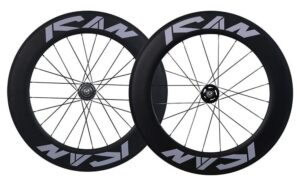In my first article in my nine-part series exploring the obstacles that may be holding you back from your triathlon goals, I introduced you to the fact that you’re feeling held back from achieving your triathlon goals may not be that you need to do more, but rather in identifying unconscious forces that are actually blocking the path to your goals. In this article, I will introduce you to “overinvestment” in triathlon which can act as the foundation of all of the obstacles that I discuss in this series. Overinvestment occurs when too much of your self-identity is comprised of your investment in our sport. Self-identity refers to how you perceive yourself and the different roles you play in your life. For example, different aspects of a self-identity can include triathlete, student, friend, son/daughter, sister/brother, and many others. You can think of self-identity as a pie consisting of different sized pieces that are the components of your self-identity. The number of pieces of pie that comprise your self-identity and how big each of those pieces are determines the degree of your investment.
 Overinvestment occurs when, in this case, triathlon is a very large piece and you have very few or very small other pieces of your self-identity pie. This overinvestment becomes harmful when your triathlon identity plays too large a role in how you feel about yourself and threats to that part of your self-identity, in the form of setbacks and disappointing performances, are truly unsettling to you as expressed in doubt, worry, and anxiety.
Overinvestment occurs when, in this case, triathlon is a very large piece and you have very few or very small other pieces of your self-identity pie. This overinvestment becomes harmful when your triathlon identity plays too large a role in how you feel about yourself and threats to that part of your self-identity, in the form of setbacks and disappointing performances, are truly unsettling to you as expressed in doubt, worry, and anxiety.
One very good gauge of the degree of investment you have in your triathlon is your emotional reactions on the day of a race. Consider what you think and how you feel before a race. Are you negative, uncertain, worried? Do you feel stress, anxiety, fear? Are you sweating, is your heart pounding, do you feel short of breath, and are your muscles tight and shaky? Do you feel as if you want to flee the event rather than compete? Now, consider how you feel after a race. In the unlikely event that you have a good performance with those reactions before a race, do you feel excited or relieved? Probably the latter because you are relieved to have avoided the assault on your self-identity that comes with failure. If you performed poorly, do you feel devastated, as if your self-identity was attacked? All of these “red flags” are caused by a perceived threat to your self-identity and the cause of that threat reaction is an overinvestment in our sport.
“Too” Zone
“Too” is one of the most dangerous words in triathlon. Doing anything too is not a good thing. When your self-identity is overly invested in our sport, you enter what I call the “too” zone. You want to care about your participation in triathlon, but you don’t want to care too much. You want our sport to be important to you (otherwise, why do it!), but you don’t want it to be too important. You want to try hard in your efforts, but you don’t want to try too hard.
but you don’t want to try too hard.
The too zone is a direct result of the obstacles I will be discussing in this series, including overinvestment, perfectionism, fear of failure, expectations, and negativity. It also arises due to a preoccupation with results and self-imposed pressure as well as pressure from others.
When you enter the too zone, your involvement in triathlon has too big a place in your self-identity and, as a result, shifts from being a challenge to pursue to a threat to avoid, where the threat is failure. Your reactions when you are in the too zone are, not surprisingly, neither pleasant nor helpful. Triathlon stops being fun; you have to take it very seriously to ensure you protect yourself from the threat of failure. You overthink in an attempt to feel more in control and to reduce the feelings of threat. Your confidence and motivation deteriorate because you don’t believe that you can overcome the threat you are faced with. You become physically tense and anxious as your body tries to prepare for the threat. The likely end result is a poor performance and no enjoyment in your effort.
Life or Death
 When you are overly invested in triathlon, you turn your participation into a life-or-death encounter. Consider this somewhat disturbing scenario. Imagine you’re about to begin a race and a man approaches you and tells you that if you don’t win, he’ll be at the finish and will kill you. How will you feel? Well, terrified. And how will you perform? In all likelihood, very poorly because you will be incredibly scared. Now, of course, there is no one waiting at the end of a race who is going to kill you physically. But, if you are overly invested in triathlon, there is someone there who may kill another part of you, namely, your self-identity and, by extension, your self-esteem and your triathlon hopes and dreams. That person waiting at the finish line ready to harm you is, of course, you.
When you are overly invested in triathlon, you turn your participation into a life-or-death encounter. Consider this somewhat disturbing scenario. Imagine you’re about to begin a race and a man approaches you and tells you that if you don’t win, he’ll be at the finish and will kill you. How will you feel? Well, terrified. And how will you perform? In all likelihood, very poorly because you will be incredibly scared. Now, of course, there is no one waiting at the end of a race who is going to kill you physically. But, if you are overly invested in triathlon, there is someone there who may kill another part of you, namely, your self-identity and, by extension, your self-esteem and your triathlon hopes and dreams. That person waiting at the finish line ready to harm you is, of course, you.
Create a More Balanced Self-identity
The most direct way to reduce your overinvestment in our sport is to alter the composition of your self-identity. You can do this in two ways. First, you can recognize other important areas of your self-identity that you may not pay much attention to, for example, family member or student, and gain appreciation for their role in your life. In doing so, you are able to gain greater validation from those aspects of your self-identity. Second, you can also actively create new sources of self-identity by seeking out new roles in your life, for example, take up a new hobby, pursue something you’ve been interested in for a while, or give back to your community. However, you develop a more balanced self-identity, you shrink the size of the pie that triathlon assumes and, as a result, lessen the impact that our sport has on your self-identity.
Invest in Yourself
There is no doubt that, when you care deeply about triathlon and you invest time, effort, and energy into being the best you can be, it can turn into overinvestment, you can enter the too zone, and our sport can feel like life or death. Your “survival” as a triathlete depends on your continuing to improve, getting better results, and climbing the competitive ladder. So, if you perform well, you continue to “live” as an athlete; if you perform poorly, you “die” as an athlete.
But the reality is that triathlon isn’t life or death. Regardless of whether you win or lose, achieve your athletic goals or not, you will survive. Of course, you will be disappointed. You will be sad and hurt and angry and frustrated, and you will think that life is over for you. But it isn’t. In time, you will get over it because you will realize that no matter what happens, you will be okay. You will continue on with your life, perhaps go to or finish school, find a career, maybe get married and have children. You will continue to have other sources of meaning, satisfaction, and joy. You will look back on your triathlon involvement with fondness and pride, remembering the fun you had, its successes and failures, and the many life lessons you learned that prepared you to pursue new dreams in other parts of your life.
because you will realize that no matter what happens, you will be okay. You will continue on with your life, perhaps go to or finish school, find a career, maybe get married and have children. You will continue to have other sources of meaning, satisfaction, and joy. You will look back on your triathlon involvement with fondness and pride, remembering the fun you had, its successes and failures, and the many life lessons you learned that prepared you to pursue new dreams in other parts of your life.
If you can truly accept this reality deep down, you will have a life-changing epiphany. You will let go of your overinvestment and be liberated from fear and able to pursue your triathlon goals with vigor and without hesitation. As you approach races, you will feel more motivated, confident, relaxed, and focused. You will be excited, rather than afraid of competing. You will feel prepared physically, emotionally, and physically. And with this reasonable amount of investment in triathlon, you set yourself up to succeed and, in doing so, have a better chance of achieving the goals you set for yourself and maximizing your enjoyment of our amazing sport.
“F&%# it” Attitude
I want to begin this last section that has such an irreverent and unprintable title by apologizing for it. I’m not one to use profanity frequently and, in many instances, it can certainly distract from the message you’re trying to send or simply sends the wrong message. At the same time, there are times when “Gosh darn it!” or “Drat!” just doesn’t do justice to the power of the message you’re trying to communicate or the emotions that underlie them. In these cases, some well-placed profanity can, in my view, best express the intensity of what you are feeling and communicate with prism-like clarity what you’re trying to say.
 Let me begin my explanation of what the “f&%#-it!” attitude is by describing what it is not. This attitude doesn’t mean not caring about yourself, other people, triathlon, or your life. It doesn’t mean not trying your best or giving up. It by no means suggests that you should surrender in any way to the seeming uncontrollability and serendipity of life. And the “f&%#-it!” attitude definitely doesn’t mean bailing out on our sport or yourself.
Let me begin my explanation of what the “f&%#-it!” attitude is by describing what it is not. This attitude doesn’t mean not caring about yourself, other people, triathlon, or your life. It doesn’t mean not trying your best or giving up. It by no means suggests that you should surrender in any way to the seeming uncontrollability and serendipity of life. And the “f&%#-it!” attitude definitely doesn’t mean bailing out on our sport or yourself.
To the contrary, the “f&%#-it!” attitude enables you to engage more deeply in our sport. It liberates you to do so because, at the heart of the “f&%#-it!” attitude, is being able to let go of overinvestment in triathlon. In other words, it means not caring too much about your successes and failures, your emotional highs and lows. The “f&%#-it!” attitude involves being absorbed in the experience of our sport and being able to accept and grow from whatever triathlon presents to you.
With the “f&%#-it!” attitude, you give up expectations, both internal and external, self-imposed and outside pressure, and any pre-occupation with “what should be” or “what might happen if.” You are not driven by fear or doubt or any other negative thoughts or emotions that can prevent you from engaging yourself fully and without hesitation in triathlon. You are able to throw yourself completely and with absolute vigor into everything you do in our sport because the only thing that could hold you back—failure!—is no longer an existential threat, but rather one possible outcome that, should it occur, you can live with.
The “f&%#-it!” attitude means that you will embrace every opportunity that triathlon presents to you and, at the end of a race, season, career, or on your death bed, you will have no regrets because you “left it all out there.”
Do you want to take the next step in training your mind to perform your best in training and on race day? Here are four options for you:
- Read my latest mental training book: Train Your Mind for Athletic Success: Mental Preparation to Achieve Our sports Goals.
- Listen to my Train Your Mind for Athletic Success
- Take a look at myonline mental training courses.
- Schedule a 1:1 session with me.






